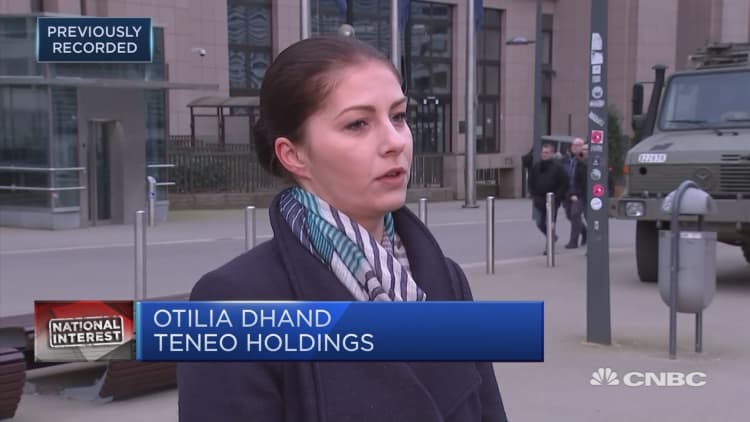
If you're waiting for Russia to be firmly punished for its alleged nerve agent attack on a former spy in England, don't hold your breath.
Following several years of what some have criticized as the U.K. government's overly-lax policy towards Russia, experts aren't betting on any sweeping measures that would send a ground-shaking message to the Kremlin over its recent behavior.
This is, in part, because of the U.K.'s economic ties to Moscow, as well as divided interests within the European Union (EU), thanks to several countries' heavy reliance on Russian resources.
If the Kremlin is testing how far it can push the U.K. and get away with it, it may end up pleasantly surprised.
"Russia has made clear that it does not see British sanctions as a major threat at this moment," Max Hess, political risk analyst at AKE Group, told CNBC on Monday.
He pointed out that as Prime Minister Theresa May announced last week the expulsion of 23 Russian diplomats from the U.K., Russia's state energy giant Gazprom placed €750 million ($923 million) in bonds through the London market.
Actions over words
Alarm in Europe over the March 4 nerve gas attack on former Russian spy Sergei Skripal and his daughter in Salisbury, deemed by British authorities to have been directed by Moscow, manifested itself in vocal exclamations of support and solidarity for Britain from EU member states. Russia has denied any involvement, calling the accusations "fantasy" and "nonsense."
But delivering a uniform response beyond words may prove more difficult. Otilia Dhand, senior vice president at Teneo Intelligence, spoke to CNBC from Brussels about EU leaders' deliberations.
"I don't get the feeling that among EU leaders there is a big appetite for additional economic sanctions on Russia," Dhand said. "In fact, this is quite unlikely. Individual sanctions? Probably, yes."
Targeted sanctions on Russian individuals may be forthcoming — it is too early to judge how stringently May's government will pursue individuals via mechanisms such as unexplained wealth orders and visa bans. But the prime minister has warned there would be "more to come."
However, some of the more painful measures that the EU could deploy against Russia — directed against its broader economy — are less likely.
Divided national interests
This is because European policies toward Moscow are based on the individual interests of member states, Dhand said. "Some of them are highly dependent on imports of energy from Russia, some are personally or politically aligned with Putin, and individual interests of these countries effectively question the cohesion of EU policy on Russia."
A case in point is Nord Stream 2, an $11 billion project that would ship Russian gas across the Baltic. German Chancellor Angela Merkel has expressed support for the project and Germany's foreign minister has suggested easing Russian sanctions, while Poland has called for U.S. sanctions on the pipeline. German hopes for the project's success have engendered broadly softer language from the European economic powerhouse toward Moscow.
Still, Dhand added that a postponement of possibly easing sanctions against Russia was under discussion. Meanwhile, the most effective individual sanctions, she said, would be those that targeted members of Russian President Vladimir Putin's inner circle.
Domestic politics: The U.K. in limbo
Domestic politics in the U.K. could see future action go either way.
"May [could be] seeing this as an opportunity to show her strength," said Tim Ash, senior sovereign strategist at BlueBay Asset Management. "Russian ridicule of the U.K., and the British establishment, likely will have not helped the mood in Her Majesty's government, and the likelihood that we see further and significant sanctions iterations."
So far, however, Moscow was likely "relieved that this could have been a lot worse," Ash said.
The financial weight of Russians in the U.K., and particularly in London, will also be a consideration. U.K.-Russia trade in 2016 was worth $14 billion. And large chunks of the London's professional services industry reliant on high-net worth Russian clients will likely lobby against reforms.
"The U.K. can't simply take a policy decision to 'kick out the oligarchs' – it can only do so as part of a longer term, sustained process," said Daragh McDowell, principle Russia analyst at Verisk Maplecroft. "Whether the May government will be able to maintain the focus to do so, given the other priorities on its plate at the moment, is unclear."
And while such moves would sting some in the Kremlin, said AKE's Hess, "It would have a noticeable impact on the U.K. economy as well and would be risky for the British government to take action calling London's status as the global home of excess capital into question with only a year to go before Brexit."
A weak precedent
The U.K. witnessed a similar assassination on its soil, the poisoning of former Russian spy Alexander Litvinenko, in 2006, responding with limited diplomatic sanctions against Russia and only launching a public inquiry nearly a decade after the fact.
Tony Brenton, a former British ambassador to Russia, recently criticized the weakness of the response. He urged more robust action in light of the Skripal attack but warned against isolating Russia, arguing the West needs improved relations with its eastern neighbor to tackle global problems like terrorism and arms control.
So while the U.K. deliberates a response as Putin basks in his recent election victory, the commitment to action that could sufficiently deter future attacks on British soil will be what determines the country's seriousness in confronting Russia.


